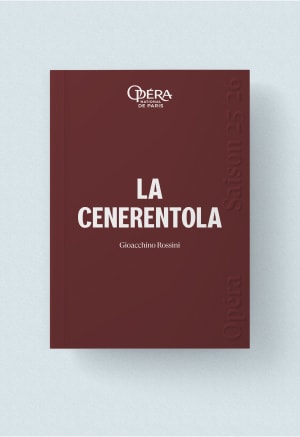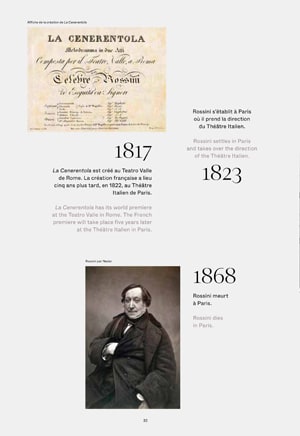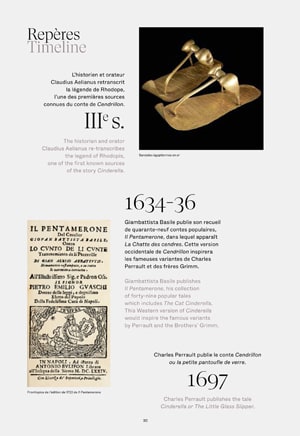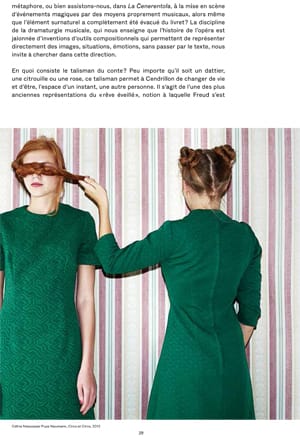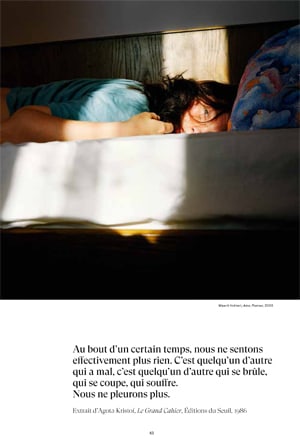Synopsis
Listen to the synopsis
Once upon a time, there was... the story of Cinderella. But a Cinderella without fairies, pumpkins or glass slippers. Gioacchino Rossini’s opera, based on a libretto by Jacopo Ferretti, is a far cry from Charles Perrault’s version!
Although stripped of supernatural elements, this work, created in 1817 for the Carnival of Rome, nonetheless delivers its store of magic. That of a sparkling score with irresistible tunes that Rossini composed in just 24 days, topping off this tour de force with a blend of virtuoso comedy and tender melancholy.
Director Guillaume Gallienne places the characters on the edge of a volcano ready to erupt, delicately underlining the halftones of this multi-faceted score.
Duration : 3h10 with 1 interval
Language : Italian
Surtitle : French / English
Artists
Dramma giocoso in two acts (1817)
After Cinderella by Charles Perrault
Creative team
Cast
The Paris Opera Orchestra and Chorus
Media


Watch online the recording from season 16/17 on Paris Opera Play!
starring Teresa Iervolino, Juan José De León, Maurizio Muraro, Chiara Skerath...
Access and services
Palais Garnier
Place de l'Opéra
75009 Paris
Public transport
Underground Opéra (lignes 3, 7 et 8), Chaussée d’Antin (lignes 7 et 9), Madeleine (lignes 8 et 14), Auber (RER A)
Bus 20, 21, 27, 29, 32, 45, 52, 66, 68, 95, N15, N16
Calculate my route-
Cloakrooms
Free cloakrooms are at your disposal. The comprehensive list of prohibited items is available here.
-
Bars
Reservation of drinks and light refreshments for the intervals is possible online up to 24 hours prior to your visit, or at the bars before each performance.
-
Parking
You can park your car at the Q-Park Edouard VII. It is located at Rue Bruno Coquatrix 75009 Paris (in front of 23 Rue de Caumartin).
At the Palais Garnier, buy €10 tickets for seats in the 6th category (very limited visibility, two tickets maximum per person) on the day of the performance at the Box offices.
In both our venues, discounted tickets are sold at the box offices from 30 minutes before the show:
- €35 tickets for under-28s, unemployed people (with documentary proof less than 3 months old) and senior citizens over 65 with non-taxable income (proof of tax exemption for the current year required)
- €70 tickets for senior citizens over 65
Get samples of the operas and ballets at the Paris Opera gift shops: programmes, books, recordings, and also stationery, jewellery, shirts, homeware and honey from Paris Opera.
Palais Garnier
- Every day from 10 a.m. to 6:30 p.m. and until performances end
- Get in from Place de l’Opéra or from within the theatre’s public areas
- For more information: +33 1 53 43 03 97
Online
Palais Garnier
Place de l'Opéra
75009 Paris
Public transport
Underground Opéra (lignes 3, 7 et 8), Chaussée d’Antin (lignes 7 et 9), Madeleine (lignes 8 et 14), Auber (RER A)
Bus 20, 21, 27, 29, 32, 45, 52, 66, 68, 95, N15, N16
Calculate my route-
Cloakrooms
Free cloakrooms are at your disposal. The comprehensive list of prohibited items is available here.
-
Bars
Reservation of drinks and light refreshments for the intervals is possible online up to 24 hours prior to your visit, or at the bars before each performance.
-
Parking
You can park your car at the Q-Park Edouard VII. It is located at Rue Bruno Coquatrix 75009 Paris (in front of 23 Rue de Caumartin).
At the Palais Garnier, buy €10 tickets for seats in the 6th category (very limited visibility, two tickets maximum per person) on the day of the performance at the Box offices.
In both our venues, discounted tickets are sold at the box offices from 30 minutes before the show:
- €35 tickets for under-28s, unemployed people (with documentary proof less than 3 months old) and senior citizens over 65 with non-taxable income (proof of tax exemption for the current year required)
- €70 tickets for senior citizens over 65
Get samples of the operas and ballets at the Paris Opera gift shops: programmes, books, recordings, and also stationery, jewellery, shirts, homeware and honey from Paris Opera.
Palais Garnier
- Every day from 10 a.m. to 6:30 p.m. and until performances end
- Get in from Place de l’Opéra or from within the theatre’s public areas
- For more information: +33 1 53 43 03 97
Online

Discover opera and ballet in another way

Dive into the Opera world and get insights on opera and pop culture or ballet and cinema. Scan this code to access all the quiz and blindtests on your mobile.

3 min
La Cenerentola
La Cenerentola: the true/false story
Can you unravel the true story from the false? Over to you!
DiscoverYou will also like






















































